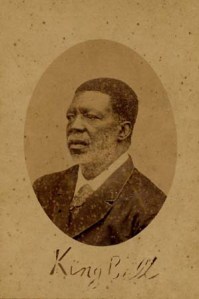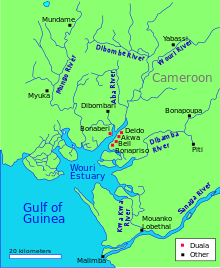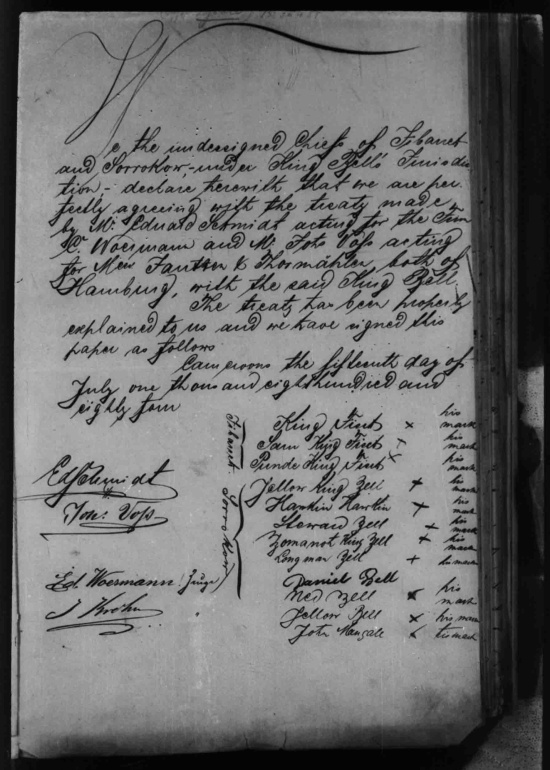
A few years back, I met some German colleagues who did not know that Germany had African colonies. I was astounded, especially given that some of these colonies (territories, people, cultures) were broken into two as a result of Germany’s loss of World War I: Great Britain and France divided Kamerun (Cameroons) and Togoland. Belgium gained Ruanda-Urundi (Rwanda and Burundi) in northwestern German East Africa, while Great Britain obtained the greater land mass of German East Africa (Tanzania), Portugal received the Kionga Triangle, a sliver of German East Africa, and South Africa gained German South-West Africa (Namibia). It is like getting punished for someone else’s sins: Africans had no say in it! Here is one of those treacherous colonial treaties Africans had to sign, and then overnight became a ‘COLONY‘, in this case a German colony. On 12 July 1884, King Ndumbé Lobé Bell and King Akwa of Cameroons River (Wouri River, Douala) signed a treaty in which they assigned sovereign rights, legislation and administration of their country in full to the German firms of Adolph Woermann and Jantzen & Thormählen. The treaty included conditions that existing contracts and property rights be maintained, existing customs respected and the German administration continue to make “comey”, or trading tax, payments to the kings as before.

Prior to signing this ‘famous’ Germano-Duala treaty of 12th July 1884, the Duala kings had the German consul sign a pre-treaty in which their rights were preserved. Little did they know that none of these clauses will be respected by the German party afterwards. The original text is found below; for more information, check out the amazing work of the Pr. Kum’a Ndumbe III of the Afric’Avenir foundation, who has done a marvelous job researching these German treaties and impact in Cameroon.
“We, the undersigned independent Kings and Chiefs of the country called Cameroons situated on the Cameroons River, between the River Bimbia on the North Side, the River Qua-Qua on the South Side and up to 4°10’ North Lat. have in a meeting held today in the German factory on King Aqua’s Beach, voluntarily concluded as follows:
We give this day our rights of Sovereignty, the Legislation and Management of this our country entirely to Mr. Edouard Schmidt acting for the C. Woermann and Mr. Johannes Voss acting for Misters Jantzen & Thormahlen, both in Hamburg, and for many years trading in this River.
We have conveyed our rights of Sovereignty, the Legislation and Management of this our country to the firms mentioned under the following reservation:

- Under reservation of rights of third persons
- Reserving that all friendship and commercial treaties made before with other foreign governments shall have full power
- That the land cultivated by us now and the places, the towns are built on shall be property of present owners and their successors
- That the Coumie shall be paid annually as it has been paid to the Kings and Chiefs before
- That during the first time of establishing an administration here, our country fashions will be respected.
Cameroons the twelfth day of July thousand eight hundred and eighty four.
Source: L’Afrique s’annonce au rendez-vous, la tête haute! Du Pr. Kum’a Ndumbe III, P. 147-148, Ed. AfricAvenir/Exchange & Dialogue 2012



Not a pretty picture whichever colonial power you look at. It’s amazing to me how people of my generation who grew up in the liberating 60s still have some notion of Britain as a benign and civilizing force in Africa. Some of what we did was well meaning, but often ill thought out and generally paternalistic. But the consequences of what we did there, not least in our divide and rule policies, and failure to develop decent infrastructure and fair governance for the indigenous populations while we there, still has consequences today. Not only that, after we shoved off, we continue to interfere, extract resources (one way or another) and foster corrupt regimes who fit in with our extensive businesses interests.
LikeLike
You said it so well Tish! I could not have said it any better.
LikeLiked by 1 person
You are very kind, Dr. Y. I rather went into rant mode, but it’s a subject that makes me very, very cross.
LikeLike
Please give me what I want not something I already know please, please.
I need: reasons for the omissions of the points in the Germsno-douala treaty
Thanks
LikeLike
Reasons for the omissions of which points?
LikeLike
Which of the douala chiefs did not sign the Germano_duala treaty??
LikeLike
Chief Kum’a Mbappe of Hickory Town (now Bonaberi) is one of those who did not sign
LikeLike
LikeLike
Timely to our history but let the truth be spoken with documentary events
LikeLike
What where the activities of the great power after 1870 that let to the outbreak of the First World War in 1914
LikeLike